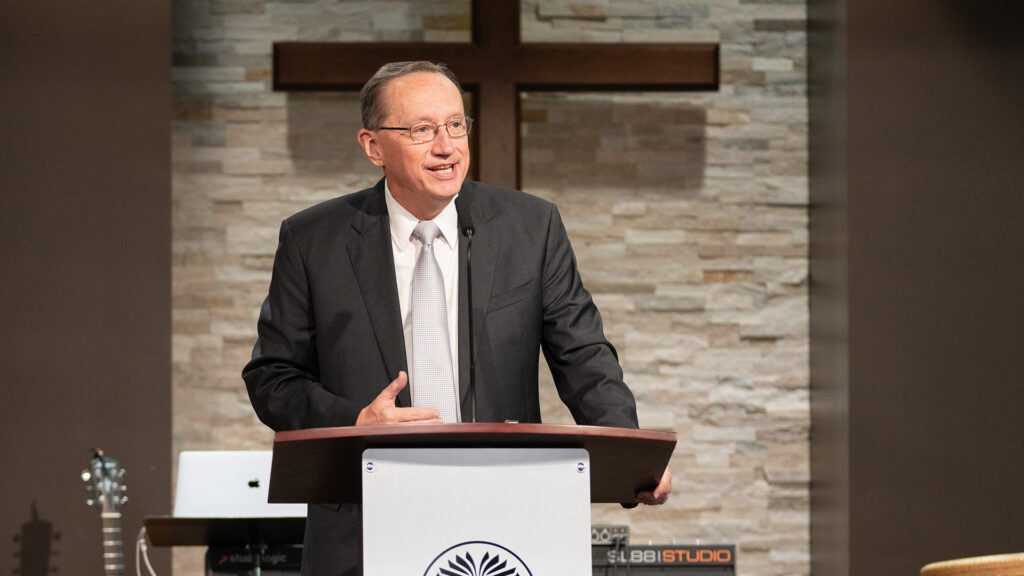
ONTARIO, Calif. (BP) – Gateway Seminary President Jeff Iorg called back to his first convocation message, delivered in August 2004, by encouraging students to maintain a passion for ministry during the school’s opening chapel services this spring semester.
He began his 40th convocation sermon with a line from the introduction of his original message.
“My goal for you is that you leave this place with a lifelong passion to accelerate the fulfillment of the Great Commission,” he said, “and a willingness to sacrifice yourself, no matter what that may mean, to see the Great Commission of the Lord Jesus Christ accelerated in our generation.”
Iorg asked attendees to read Matthew 9:35-38 with him.
Jesus continued going around to all the towns and villages, teaching in their synagogues, preaching the good news of the kingdom, and healing every disease and every sickness.When he saw the crowds, he felt compassion for them, because they were distressed and dejected, like sheep without a shepherd. Then he said to his disciples, “The harvest is abundant, but the workers are few. Therefore, pray to the Lord of the harvest to send out workers into his harvest” (CSB).
“It is noteworthy,” he said, “the word ‘passion’ is not found in our text, but a similar word, ‘compassion’ is used to describe how Jesus felt about the people He encountered and the resulting missional directive He uttered.”
Iorg explained the word “compassion” comes from a noun that refers to intestines and that the verb form means “agitation in the bowels.”
“It should be understood metaphorically; referencing deep-seated, inner emotions,” he said.
“When the word is used in the Bible, it is usually connected to some concrete action – like feeding the 4,000, granting extravagant forgiveness, or healing blind men.”
He warned against a potential misunderstanding of compassion as “sympathy, empathy or kindness,” but to hold on to this part of the word: “passion.”
“Jesus passionately met the needs of people and fulfilled His missional imperative. We need the same motivation to sustain us over a lifetime of pursuing God’s mission,” he said.
Iorg summarized the context of the passage in the preceding verses of Matthew 9: Jesus’ healing a paralytic man, a hemorrhagic woman, two blind men, reviving a young woman from death, casting a demon out of a man and provoking Pharisees.
“Jesus was vigorously engaged with hurting people in contrast to religious elites who were preoccupied with distancing themselves from the unclean masses,” he said.
“Passion is fueled by engagement with people who need Jesus. Often the opposite is taught today.”
Iorg contrasted the common ministry warnings against burnout with the invigoration Gospel ministry can provide. He pointed to Jesus’ example which demonstrates the refreshing outcome of investing in people and reaching the lost.
“When we are engaged in reaching hurting people, we experience a spiritual transaction Jesus described this way [in Matthew 16:25]: ‘For whoever wants to save his life will lose it, but whoever loses his life because of me will find it,’” Iorg said.
“There is something life-giving about selfless, self-emptying service which meets the needs of hurting people, shares the Gospel with them, and advances God’s mission at the grassroots level.”
In his concluding remarks, Iorg warned current students to protect their passion for ministry while they study; to be careful to avoid becoming “Gospel-analysts” instead of “Gospel-communicators.”
He concluded the convocation message by reiterating and revising his statement from his first convocation in 2004: “My goal is you will leave Gateway imbued with a lifelong passion for ministry leadership and a willingness to sacrifice yourself, no matter what that may mean, to accelerate the fulfillment of the Great Commission of our Lord Jesus Christ in your generation.
“May God make it so for our good and his glory.”
The message was one of Iorg’s last convocation addresses as Gateway president. He announed his upcoming retirement last October.
–30–














